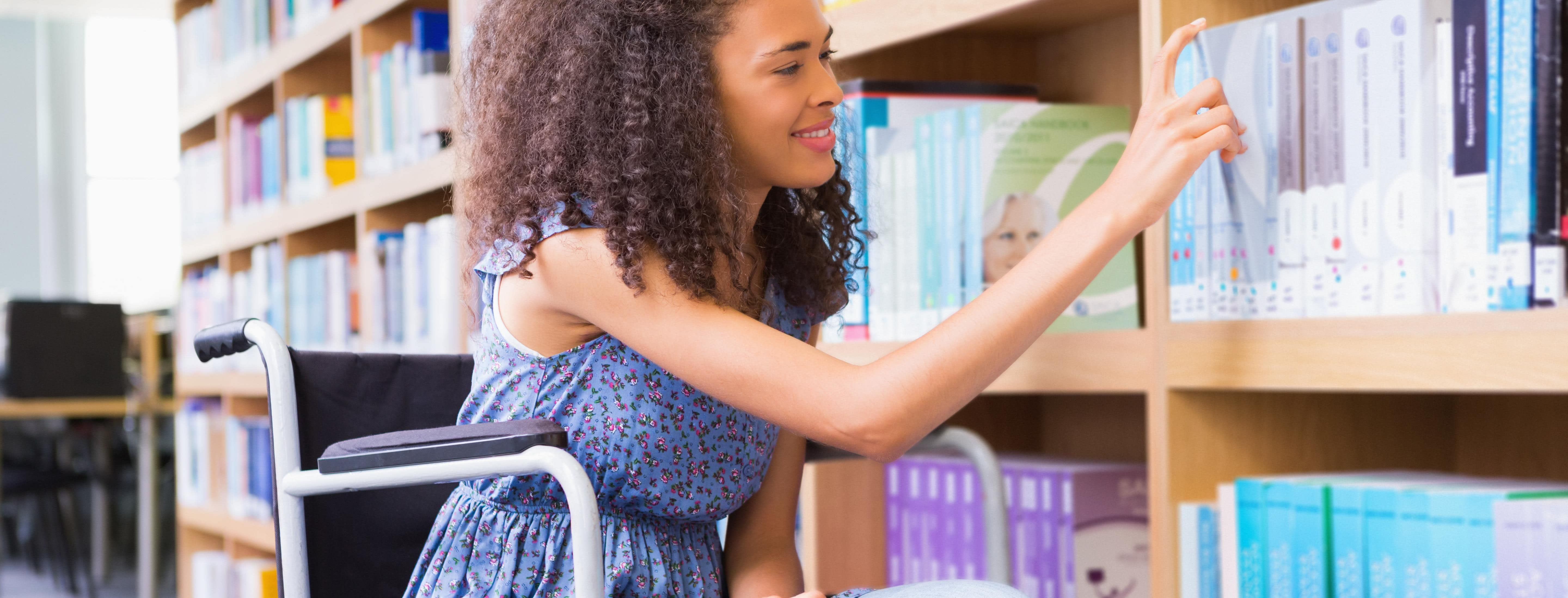What Students With Disabilities Should Know About Higher Education Today
Approximately 19 percent of undergraduate students in the US have disabilities, according to data from the US’s National Center for Education Statistics. This number has been on the rise in recent years. This is heartening news because it means more students with disabilities are going to college, but it also raises the question: Are universities keeping up with their needs? We’ve rounded up some recent news on higher education and students with disabilities.
- Education

In an article for AbilityNet, a UK university student services manager highlights eight ways universities can become more accessible and inclusive, including assessing whether the learning environment follows the principles of Universal Design for Learning (UDL); investigating whether online assessments would be more suitable for students; looking into whether professional bodies are open to adjusting coursework to be more inclusive; gleaning advice and insights from the National Association of Disability Practitioners (NADP); making sure that all new facilities are guided by inclusivity; consulting with IT advisors about accessibility; utilizing outside resources and experts; and committing to go the extra mile when it comes to supporting students with disabilities.
The Student Newspaper had a conversation with disabled students’ liberation officer Ellen Blunsdon, who shared news on several projects underway, such as Staff Mental Health Accessibility Training and furniture consultations. Blundson said of the latter, “We also have disabled students involved to help make sure that the furniture is as accessible as it can be. It is little changes like that which matter. You are going to notice them when you go into a space.”
In an article for The Guardian, Chris Skidmore, Conservative MP and UK Minister of State for Universities, Science, Research and Innovation, challenged universities to do more to level the playing field for students with disabilities. “Living with a disability should never be a barrier to entering university. We all have a collective responsibility to break down these barriers one by one and make our universities work for everyone,” he implored.
This position was echoed by another article in The Guardian, which took a personal look at what life is like at university for students with disabilities. Sean Cullen, who was diagnosed with dyslexia in his second year of college, said, “Unfortunately, the nature of having any of these conditions is that life will be more difficult, but the more you can speak to people, the more solutions you can get out of it.” The importance of speaking up was reiterated by Emma Dobson, who has cerebral palsy. “Before I started, we spoke to an adviser about my requirements. For example, I need accommodation with automatic doors. [...] I’m much more confident now, as I’ve learned you have to self-advocate and point out issues so you get what you need, like when the lift wasn’t working and I couldn’t get to my lecture.”
A FE News article also asserted that universities must do more -- especially given that going to university nearly halves the gap in employment rates between students without disabilities and students with disabilities.
Several news sources underscore the role played by technology in breaking down the barriers for students with learning disabilities. The Guardian highlights assistive technologies such as online journal articles, recorded lectures and virtual reality, and also points out that feedback is critical to the process. Digital learning consultant Alistair McNaught said, “Many higher and further institutions have inaccessible websites or inaccessible digital content. If the content is inaccessible, investments in assistive technology can be undermined at a stroke.”
On the note of virtual reality, Tech Crunch took a closer look at Microsoft’s AI for Accessibility grants, which provide support to companies looking to adapt IT to the needs of people with disabilities.
The challenges associated with finding services -- especially for students whose prior proof of disability is deemed inadequate -- is another issue pertinent to students with disabilities. And then there’s the fact that even seeking out help can be immobilizing. According to university disability network chair Felix Manocha-Seymour, “For people who struggle with asking for help or communicating their needs, it could be very difficult to get the support they need.”
And yet these services are vital, according to Caroline Butterwick, a postgraduate student with disabilities who asserts she could never have gone to college without university support services. At the same time, she laments the lack of awareness about disability resources among students. “Inclusivity should be embedded in everything universities do, from booking a wheelchair accessible venue for open day sessions to having knowledgeable staff readily available to talk to prospective disabled students about support. Perhaps most important is acknowledging that the first weeks at university are crucial to ensuring students’ support is properly in place,” Butterwick insists.
The crucial nature of disability services was further asserted by an anonymous academic in The Guardian. The writer, who used disability services while a student and now works in disability services at a university, says, “Back when I was a student, disability services changed my life. They gave me the tools to build on my inquisitive nature and expand my critical thinking skills. They helped me to identify strategies I had simply not learned at school and allowed me to regain independence in my learning. In many ways, disability services helped me to find my voice.”
The Guardian also checked in with several students with disabilities, who shared their stories and insights. Hillary Mensah, who has lupus, honed in on a less-discussed aspect: the potential isolation that goes along with attending college with a disability. “Having a disability can make it harder to fit in, especially when it’s not a visible disability, because it can be difficult to open up about your experiences. [...] Sometimes this can make you feel alone: you have to find a way to get through any problems by yourself, because you don’t want it to have a negative impact on your grades,” she writes.
For medical students, meanwhile, another potential pitfall is the question of whether or not to disclose a disability during the application process. US News & World Report provided four tips aimed at helping aspiring medical students navigate this and other challenges.
Researchers with disabilities face unique challenges, too. This is what prompted clinical neuroscientist Isobel Williams to help found the Disabled and Ill Researchers’ Network at her university, the University of Sheffield in the UK. Her advice to people looking to create similar networks at their own institutions? “Create a website for the network, and invite people at your university who have a disability or illness to write a piece about their experiences of managing their PhD or postdoc. Because many conditions can be hidden, I also advise students, no matter where they are studying, to disclose their condition to their advisers and to set up boundaries and reasonable adjustments -- for example, the need for regular breaks during the day or ruling out weekend work — that are necessary to protect their health.” She also hopes that students will accept their own disabilities and give themselves credit. “It’s a sign of strength to have got this far in academia while facing extra obstacles,” Williams concludes.
As the push for inclusivity continues to increase, countries all over the world are stepping up -- or being urged to do so. In India, for example, female and disabled PhD students have been granted new services, including a two-year extension on their theses, according to The Times of India. The aim of these new provisions? To encourage more women and differently-abled students to consider doctoral studies.
Disability advocates in Turkey calling on the Education Ministry and parliament to improve access to higher education through measures included special entrance tests and placement quotes. Down’s syndrome association Down Türkiye's head Gün Bilgin contends, “The right to education is under protection of our constitution. However, laws do not provide the necessary opportunities for individuals with mental disability. There should be affirmative action.”
In Indonesia, meanwhile, Anton Tsaputra devoted his PhD to the topic of disability-inclusive budgeting and development. His conclusion? That policies designed to support students with disabilities are falling short. “Disability is yet to become a priority in development, and people with disabilities still face a lot of barriers and challenges that will need to be overcome before they can participate actively. [...] One of the biggest contributions my thesis makes is to draw attention to the rights and citizenship of people with a disability. In Indonesia, participating and contributing to development is both a right and an obligation,” Tsaputra insists.
One promising sign that disability inclusion is entering the mainstream is that the issue has been front and center on popular television shows such as Atypical and Speechless, both of which have heavily featured the university experience into storylines about characters with disabilities. Autism advocate Kerry Magro wrote of Atypical's portrayal of the issues encountered by its autistic protagonist Sam on his journey to college, “I love how I could relate in several ways to Sam’s character. Growing up with autism, I also started college at 19 and it was a dream come true. After years during my adolescence of being told by experts that I would be lucky to graduate from high school one day, I truly saw getting into college as a milestone that I could do anything I wanted in this world.”
Find your perfect program
Use our search to find and compare programs from universities all over the world!
United Kingdom
Joanna Hughes
Author
Joanna worked in higher education administration for many years at a leading research institution before becoming a full-time freelance writer. She lives in the beautiful White Mountains region of New Hampshire with her family.
Find a program in these categories
Read related articles

Are International Students Immigrants? The Debate Explained

Six Things All International Students Should Do Before Traveling
